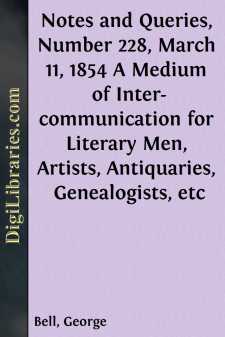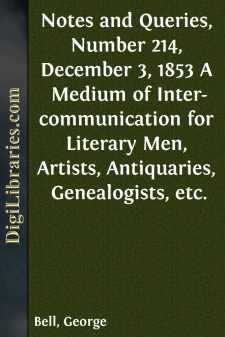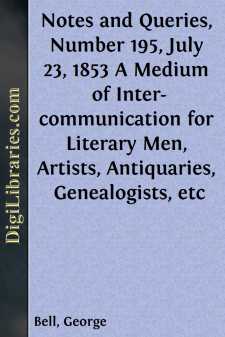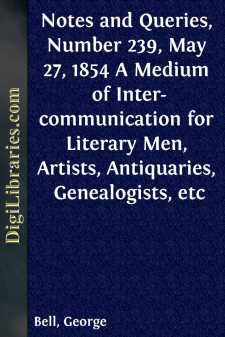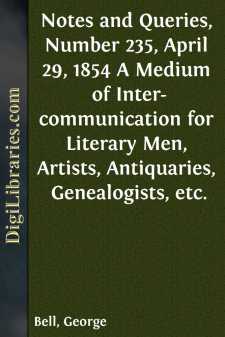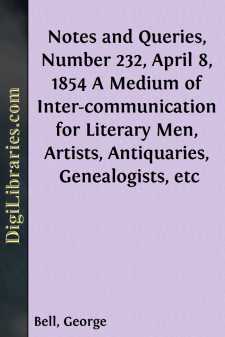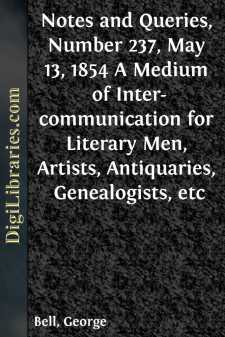Categories
- Antiques & Collectibles 13
- Architecture 36
- Art 48
- Bibles 22
- Biography & Autobiography 813
- Body, Mind & Spirit 141
- Business & Economics 28
- Children's Books 12
- Children's Fiction 9
- Computers 4
- Cooking 94
- Crafts & Hobbies 4
- Drama 346
- Education 46
- Family & Relationships 57
- Fiction 11826
- Games 19
- Gardening 17
- Health & Fitness 34
- History 1377
- House & Home 1
- Humor 147
- Juvenile Fiction 1873
- Juvenile Nonfiction 202
- Language Arts & Disciplines 88
- Law 16
- Literary Collections 686
- Literary Criticism 179
- Mathematics 13
- Medical 41
- Music 40
- Nature 179
- Non-Classifiable 1768
- Performing Arts 7
- Periodicals 1453
- Philosophy 64
- Photography 2
- Poetry 896
- Political Science 203
- Psychology 42
- Reference 154
- Religion 513
- Science 126
- Self-Help 83
- Social Science 81
- Sports & Recreation 34
- Study Aids 3
- Technology & Engineering 59
- Transportation 23
- Travel 463
- True Crime 29
Notes and Queries, Number 82, May 24, 1851 A Medium of Inter-communication for Literary Men, Artists, Antiquaries, Genealogists, etc
by: George Bell
Categories:
Description:
Excerpt
NOTE UPON A PASSAGE IN "MEASURE FOR MEASURE."
The Third Act of Measure for Measure opens with Isabella's visit to her brother (Claudio) in the dungeon, where he lies under sentence of death. In accordance with Claudio's earnest entreaty, she has sued for mercy to Angelo, the sanctimonious deputy, and in the course of her allusion to the only terms upon which Angelo is willing to remit the sentence, she informs him that he "must die," and then continues:
"This outward-sainted deputy,—
Whose settled visage and deliberate word
Nips youth i' the head, and follies doth emmew,
As falcon doth the fowl,—is yet a devil;
His filth within being cast, he would appear
A pond as deep as hell."
Whereupon (according to the reading of the folio of 1623) Claudio, who is aware of Angelo's reputation for sanctity, exclaims in astonishment:
"The prenzie Angelo?"
To which Isabella replies (according to the reading of the same edition):
"O, 'tis the cunning livery of hell,
The damned'st body to invest and cover
In prenzie guards! Dost thou think, Claudio,
If I would yield him my virginity,
Thou might'st be freed?"
Claudio, still incredulous, rejoins:
"O, heavens! it cannot be."
The word prenzie has given rise to much annotation, and it seems to be universally agreed that the word is a misprint. The question is, what was the word actually written, or intended, by Shakspeare? Steevens and Malone suggested "princely;" Warburton, "priestly;" and Tieck, "precise." Mr. Knight adopts "precise," the reading of Tieck, and thinks "that, having to choose some word which would have the double merit of agreeing with the sense of the passage and be similar in the number and form of the letters, nothing can be more unfortunate than the correction of "princely;" Mr. Collier, on the other hand, follows Steevens and Malone, and reads "princely," observing the Tieck's reading ("precise") "sounds ill as regards the metre, the accent falling on the wrong syllable. Mr. Collier's choice is determined by the authority of the second folio, which he considers ought to have considerable weight, whilst Mr. Knight regards the authority of that edition as very trifling; and the only point of agreement between the two distinguished recent editors is with respect to Warburton's word "priestly," which they both seem to think nearly conveys the meaning of the poet.
I have over and over again considered the several emendations which have been suggested, and it seems to me that none of them answer all the necessary conditions; namely, that the word adopted shall be (1.) suitable to the reputed character of Angelo; (2.) an appropriate epithet to the word "guards," in the reply of Isabella above quoted; (3.) of the proper metre in both places in which the misprint occurred; and (4.) similar in appearance to the word "prenzie." "Princely" does not agree with the sense or spirit of the particular passage; for it is extremely improbable that Claudio, when confined under sentence of death for an absurd and insufficient cause, would use a term of mere compliment to the man by whom he had been doomed....



